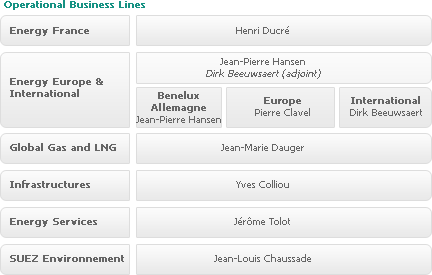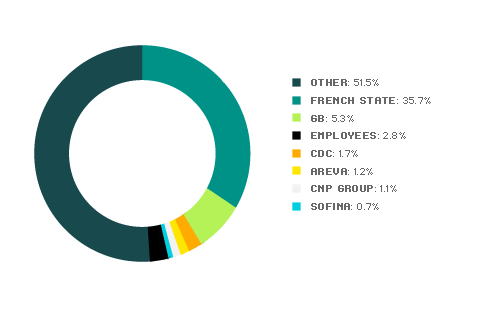Engie
| Type | Société Anonyme |
|---|---|
| Predecessor | Gaz de France Suez |
| Founded | July 22, 2008; 6 years ago |
| Headquarters | La Défense, Courbevoie, France |
| Key people | Gérard Mestrallet (Chairman and CEO), Jean-François Cirelli (Vice-Chairman and President) |
| Industry | Electric utility |
| Products | Natural gas production, sale and distribution, electricity generation and distribution, hydroelectricity, wind power, energy trading |
| Revenue | €90.7 billion (2011)[1] |
| Operating income | €8.795 billion (2010)[1] |
| Net income | €4.616 billion (2010)[1] |
| Total assets | €184.66 billion (end 2010)[1] |
| Total equity | €70.72 billion (end 2010)[1] |
| Employees | 236,120 (average, 2010)[1] |
| Website | engie.com |
Engie (known as GDF Suez prior to April 2015) is a French multinational electric utility company, headquartered in La Défense, Courbevoie, which operates in the fields of electricity generation and distribution.
Contents
History
Suez was a French multinational corporation, operating in the fields of waste management, energy supply through the manipulation of electricity and natural gas, and water treatment/purification. It was a result of the business merger between the Compagnie financière de Suez, the french corporation that built the Suez Canal, and Lyonnaise des Eaux, a leading French water company. In 2001, the water and waste assets of Suez were developed into a separate company, Suez Environment. In July 2008, Suez Lyonnaise des Eaux became GDF Suez, after a corporate merger with the french utilities corporation Gaz de France. The company Suez does not exist as such anymore, but it continues its operations through its two main corporate ramifications: Suez Environmental and GDF Suez. To this day, it is reported as the world's second largest utilities company in the world, as it employs over 260,000 workers worlwide, and in 2007 reported revenues of over $130 billion USD[2][3] (2007).
U.S. Coal Plants
| Plant | State | Year(s) Built | Capacity |
|---|---|---|---|
| Red Hills Generation Facility | MS | 2001 | 514 MW |
Company History[4]
- 1880: Establishment of La Société Lyonnaise des Eaux et de l'Eclairage and management of the water supply in Cannes, France.
- 1919: La Société Industrielle des Transports Automobiles (SITA) is set up in Paris to meet the city's needs in terms of waste collection.
- 1939: Establishment of Degrémont, a water treatment company in Paris.
- 1948: Degrémont builds Egypt’s first drinking water treatment plant.
- 1960: SITA rapidly expands thanks to numerous contracts in the Paris suburbs.
- 1975: First desalination plant by reverse ormosis in Riyadh, Saudi Arabia.
- 1989: SITA begins operations in Asia, first in Malaysia and later in Hong Kong.
- 1997: La Lyonnaise des Eaux merges with Compagnie financière de Suez, creating Suez Lyonnaise des Eaux.
- 2001: Suez Lyonnaise des Eaux becomes SUEZ ENVIRONMENTal . Water operations in France are grouped together under the name Lyonnaise des Eaux.
- 2002: Grouping together of the environmental operations of SUEZ within one branch
- 2008: Suez Lyonnaise des Eaux became GDF Suez, after a corporate merger with the french utilities corporation Gaz de France
- 2011: GDF Suez enters negotiations with Duke Energy, a major US utility, to buy Duke's approximately $18.8 billion in assets in Latin America. [5]
Historical Financial Information[6]
(All information in USD unless indicated otherwise)
| 2006 | 2005 | |
|---|---|---|
| Revenue (USD) | $59,689,000,000 | $50,274,000,000 |
| Gross Profit | $21,861,000,000 | $18,790,700,000 |
| Operating Income | $7,086,000,000 | $5,324,000,000 |
| Total Net Income | $3,542,000,000 | $2,081,000,000 |
Business Strategy
According to its website, Suez' mission[7] is to:
- Offer "innovative energy solutions".
- Ensure "the security of Europe’s energy supply, creating the neccesary infrastructure".
- Assist "individuals, cities and businesses in developing a responsible relationship towards energy".
- To place sustainable development at the heart of its businesses, developing renewable energy, and fighting against global warming.
- Develop synergies between its businesses in energy, energy services and the environment.
Latin American energy assets
GDF SUEZ Energy Latin America has energy projects in Argentina, Brazil, Chile, Costa Rica, Panama, and Peru.
Suez's assets in Brazil include a stake in the Jirau hydroelectric dam and control of Tractebel Energia, Brazil's biggest private electricity generator, with 6,000 MW of capacity, Valor said. Suez has about 3,170 MW of capacity in the rest of Latin America and is building another 1,200 MW in the region. [8]
Political Contributions/Lobbying
In 2008, Suez spent $130,000 USD in lobbying, and in 2006-2007, its lobbying expenditures amounted to $160,000 USD.
Issued lobbied included: Securities and Investment, Miscellaneous Energy, and Electric Utilities, [9]
Corporate Accountability
Suez has been heavily criticized by many international campaigs, led by various NGO'S and human rights associations, citing the corporation for a range of abusive practices, especially in the fields of water management and privatization policies; amongst many allegations[10] , Suez has been accused of:
- Refusing to extend water services to poor neighborhoods
- Cutting off water in zones where people are unable to pay
- Non-compliance with contractual requirements for maintenance and investment
- Raising rates to unaffordable levels
- Threatening legal action when contracts are terminated
- The NGO Food and Water Watch set up a website so that people would be able to directly contact Suez's CEO Gerard Mestrallet and be able to "challenges Suez's irresponsible and dangerous actions around the world". Please click here to view the website and contact Suez directly
- Controversy over water privatization policies in Mexico and low quality water
2003
Suez, the second-largest water company in the world, has over 100 concession and joint corporate ventures worldwide. In Cancun, Mexico, the water and sewage system is run by AguaCan, a company 50% controlled by Suez. The corporate giant has been under fire for the low quality of the drinking water, which forces locals to have to buy containers of purified water, given the uselessness of the running water. Community activist Arturo Moss also claims that not only is the water far from usable, but a vast majority of locals do not have access to many of the basic services that the company claims to provide. "In Cancun, in the hotel zone they have water 24 hours a day, but here in the urban areas the service is very limited: only for 2 or 3 hours a day"[11].
Labor
Human Rights
Environment
In June 2009 GDF Suez SA, through its subsidiary Electrabel S.A. (Electrabel), began construction of an 800 megawatt (MW) combined biomass/coal fired power station in Rotterdam, Netherlands. The project represents a total investment of EUR1.2 billion. The power station will have an energy efficiency of around 46%. The power station can burn half coal and half biomass, and is scheduled for completion in 2013.[12]
Consumer Protection and Product Safety
Anti-Trust and Tax Practices
Social Responsibility Initiatives
Business Scope
Suez' corporate activities can be divided into six operational business lines, comprising five in energy and one in environment, seen in the following table[13]:
Click here for an in-depth look into each of Suez' operational business lines
Financial Information (as of DATE)[14]
Presented in USD, unless indicated otherwise.
FINANCIAL DATA FOR GDF SUEZ
| 2008 (half year results) | |
|---|---|
| Revenue (USD) | $60,015,327,840.89 |
| Operating Income | $7,657,227,019.98 |
| EBITDA (Earnings Before Interest, Taxes, Depreciation and Amortization) | $11,339,640,491.72 |
GDF SUEZ SHAREHOLDER STRUCTURE[15]
FINANCIAL DATA FOR SUEZ ENVIRONMENT
| 2008 (end of September) | |
|---|---|
| Revenue (USD) | 12,697,771,868.89 |
| EBITDA (Earnings Before Interest, Taxes, Depreciation and Amortization) | $2,153,651,253.28 |
SUEZ ENVIRONMENT SHAREHOLDER STRUCTURE[16]
Governance
GDF SUEZ
Composition of the Board of Directors[17]
The board of directors is made up of 24 permanent members, subdivided as follows:
- 4 directors who are also employees, as required under Clause 8-1 of the French Law of August 6, 1986 (3 elected by employees, 1 representing employee shareholders).
Also with seats on the Board:
- 1 representative of the Central Works Council.
SUEZ ENVIRONMENT
The SUEZ ENVIRONNEMENT Board of Directors is comprised of 18 members, including:
9 representatives of the GDF SUEZ Group,
5 directors representing the other shareholders of the agreement: Groupe Bruxelles Lambert (2), Areva (1), CNP (1) and Sofina (1),
4 independent directors, jointly nominated by the parties to the shareholders' agreement as proposed by the Chairman of the Board.
- Gérard Mestrallet: Chairman and Chief Executive Officer of GDF Suez Chairman of the Board of Directors of SUEZ ENVIRONNEMENT
- Jean-Louis Chaussade: Chief Executive Officer
- Gérard Lamarche: Executive Vice-President and Chief Financial Officer of GDF Suez
Please click here to view the entire Board of Directors and list of executives for SUEZ ENVIRONMENT
Contact Information
Articles and Resources
Books on the Company
Related SourceWatch Articles
- Mississippi and coal
- United States and coal
- Global Warming
- Lord Simon of Highbury
- Edward J. Mooney
- Marie-Ange Debon
Sources
- ↑ 1.0 1.1 1.2 1.3 1.4 1.5 Annual Report 2010 (PDF). GDF Suez. Retrieved on 1 April 2011.
- ↑ "GDF Suez Company Profile", GDF Suez website, Accessed December 2008
- ↑ Suez Environmental, "2007 Key Financial Figures", Suez Environmental website, Accessed December 2008
- ↑ Suez Environmental, "Suez History: Timeline", Suez Environmental website, Accessed December 2008
- ↑ "GDF Suez may buy control of Duke's Latam assets" Reuters, June 28, 2011.
- ↑ Hoovers' Corporate Financial Database, "GDF Suez Historical Financial Information", Hoovers website, Accessed January 2009.
- ↑ GDF Suez, "Suez Group Mission Statement", GDF Website, Accessed January 2009
- ↑ Paulo Winterstein "GDF, Duke in talks to merge LatAm electric assets" Market Watch, June 28, 2011.
- ↑ OpenSecrets: Centre for Responsive Politics, "Annual lobbying expenditures by Suez", OpenSecrets Website, Accessed January 2009
- ↑ Food and Water Watch, "Civil movement against Suez' water privatization practices", Food and Water Watch Website, Accessed January, 2009
- ↑ CorpWatch, "Suez' World Water Wars", CorpWatch Website, Accessed January 2009
- ↑ "GDF Suez Begins Construction Of 800 MW Combined Biomass/Coal Fired Power Station In Rotterdam, Netherlands" Energy Business Review, June 22, 2009
- ↑ GDF Suez, "GDF Suez Group Operational Business Line", GDF Suez Website, Accessed January 2009
- ↑ GDF Suez, "2008 Key Financial Figures", GDF Suez Website, Website accessed December 2008
- ↑ GDF Suez, "GDF Suez Shareholder information", GDF Website, Accessed December 2008
- ↑ Suez Environment, "Suez Environment Shareholder structure", Suez Environment Website, Accessed January 2009
- ↑ GDF Suez, "GDF Suez Board of Directors/Biographies", GDF Website, Accessed January 2009
External Resources
External Articles
Wikipedia also has an article on Engie. This article may use content from the Wikipedia article under the terms of the GFDL.


